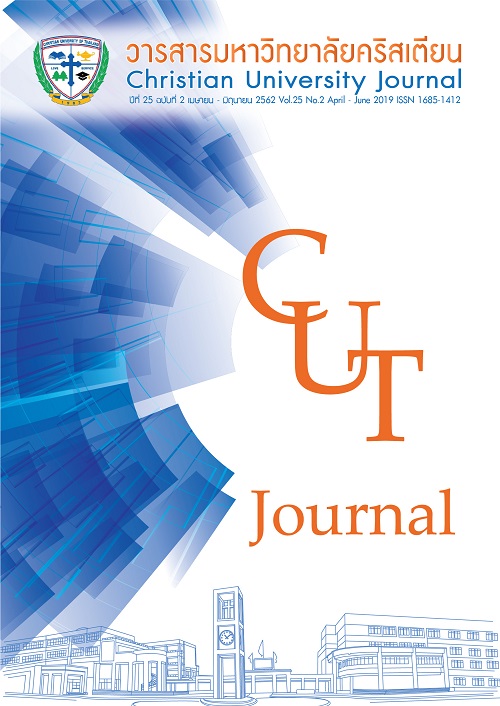ประสิทธิผลระหว่างเทคนิคการสอนคำศัพท์โดยไม่ใช้บริบทและ ใช้บริบทต่อการเรียนรู้คำศัพท์
คำสำคัญ:
การสอนคำศัพท์ภาษาอังกฤษ, การสอนแบบไม่ใช้บริบท, การสอนแบบใช้บริบท, ความรู้คำศัพท์บทคัดย่อ
การสอนคำศัพท์เป็นสิ่งสำคัญในการช่วยเหลือผู้เรียนภาษาอังกฤษในฐานะภาษาต่างประเทศเพื่อเสริมสร้างความรู้คำศัพท์ บทความนี้มีจุดประสงค์เพื่ออภิปรายประสิทธิผลระหว่างเทคนิคการสอนคำศัพท์โดยไม่ใช้บริบทและใช้บริบทต่อผลสัมฤทธิ์การเรียนรู้คำศัพท์ของผู้เรียน เทคนิคการสอนคำศัพท์โดยไม่ใช้บริบทอาจเหมาะสมสำหรับผู้เริ่มต้นและเสริมสร้างการจำคำศัพท์ภายในเวลาจำกัด เทคนิคการสอนคำศัพท์โดยใช้บริบทอาจช่วยเหลือการจำคำศัพท์ด้วยบริบทและอาจเสริมสร้างการจำคำศัพท์ระยะยาว นอกจากนี้เทคนิคการสอนคำศัพท์โดยใช้บริบทสามารถเสริมสร้างความเข้าใจในการอ่านในขณะที่อ่านบทความอีกด้วย จากผลงานวิจัยต่างๆสรุปได้ว่าการสอนคำศัพท์เพียงวิธีเดียวไม่สามารถทำให้ผู้เรียนประสบความสำเร็จในการเรียนรู้คำศัพท์ ผู้สอนควรบูรณาการทั้งเทคนิคการสอนคำศัพท์โดยใช้บริบทและไม่ใช้บริบทในรายวิชา การที่นักศึกษามหาวิทยาลัยได้รับการฝึกฝนการใช้บริบทในการเรียนศัพท์จะช่วยพัฒนาความสามารถศัพท์ในการอ่านรูปแบบต่างๆ ได้
เอกสารอ้างอิง
Alhaysony, M. (2012). Vocabulary Discovery Strategy Used by Saudi EFL. International Journal of Linguistics. 4(2), 518-535.
Amirian, S. M., & Momeni, S. (2012). Definition-based Versus Contextualized Vocabulary Learning. Theory and Practice in Language Studies. 2(11), 2302-2307.
Azabdaftari, B. & Mozaheb, M., A. (2012). Comparing vocabulary learning of EFL learners by using two different strategies: mobile learning vs. flashcards. The EUROCALL Review (20), 47-54.
Chansin, W. (2007). A study of English vocabulary learning strategies of good and poor learners of English at the university level. (Unpublished master's thesis). Khonkaen University, Khonkaen.
Fitzpatrick, T. A.-Q. (2008). Intensive Vocabulary Learning: A Case Study. Language Learning Journal. 36(2), 238-248.
Kermani, S. K., & Seyedrezaei, S. H. (2015). The Effect of Contextualized Vocabulary Teaching on Learners' Vocabulary Learning and Retention. Journal of Language Sciences & Linguistics. 3(5), 90-95. Retrieved from https://www.jlsljournal.com.
Khabiri, M., & M.Pakzad. (2012). The Effect of Teaching Critical Reading Strategies on EFL Learners’ Vocabulary Retention. The Journal of Teaching Language Skills (JTLS), 31(1), 73-106.
Khaghaninejad, Mohammad & Amirahmadi, Fatemeh. (2015). The Effect of Unknown Words' Contextualization on Comprehending Unseen Reading Passages and Vocabulary Development. International Journal of Review in Life Sciences. 5(11), 23-29.
Kuehn, P. (2018). Should we use translation when teaching vocabulary? Retrieved from https://hubpages.com/education/EFL-Teaching-Is-There-a-Need-For-Translation-When-Teaching-Vocabulary.
Leaver, B. L., Ehrman, M. & Shekhtman, B. (2005). Achieving success in second language acquisition. Cambridge: Cambridge University Press.
Liangpanit, C. (2015). Thai Teachers’ Reflections on Vocabulary Pedagogy in Thai EFL Class. Retrieved from https://icsai.org/procarch/1iclehi/1iclehi-58.pdf
Mala, D. (2018). Thai English Proficiency Drops. Retrieved from https://www.bangkokpost.com/news/general/1570042/thai-english-proficiency-drops
Mediha, N. & Enisa, M. (2014). A comparative study on the effectiveness of using traditional and contextualized methods for enhancing learners’ vocabulary knowledge in an EFL classroom. Procedia - Social and Behavioral Sciences. (116), 3443-3448.
Ministry of Education (MOE). (2008). The basic education core curriculum B.E.2551 (AD 2008).Mohammadnejad, S. (2012). Reactivating EFL Learners' Word Knowledge by Means. International Journal of Linguistics. (4), 394.
Nuraisha, Suhartono, L., & Husin, S., (n.d.). Teaching Vocabulary by Using Inference Contextual Clues. Retrieved from https://download. portalgaruda.org/article.php? article=320480&val=2338&title=TEACHING%20VOCA BULARY%20BY%20USING%20INFERENCE%20CONTEXTUAL%20CLUES.
Orawiwatnakul, W. (2011). Impacts Of Vocabulary Acquisition Techniques Instruction. Journal of College Teaching & Learning. 8(1), 47-52.
Oxford, R., & Crookall, D. (1990). Vocabulary Learning: A Critical Analysis of Techniques. TESL CANADA JOURNAL. 7(2), 9-30.
Phonlawan, M. (2014). Effect of guessing vocabulary meaning through contextual clues and bilingual word lists of high vocational certificate students. (Master's thesis). Buriram Rajabhat University. Buriram.
Shen, W. W. (2003). Current trends of vocabulary teaching and learning strategies for EFL settings. The Feng Chia Journal of Humanities and Social Sciences, (7), 187-224.
Shokouhi, H., & Askari, H. (2010). The effect of guessing vocabulary in reading authentic texts among pre-university students. Arizona Working Papers in SLA & Teaching. (17), 75-89.
Soureshjani, K. H. (2011). The Effect of Contextualizing and Decontextualizing Techniques on Lexical-oriented Knowledge of Persian EFL Language Learners. Theory and Practice in Language Studies. 1(5), 551-552.
Subon, F. (2016). Direct Vocabulary Instruction: The Effects of Contextualised Word. Procedia - Social and Behavioral Sciences, (224), 284-291.
Takahashi, N. (2011). The Effects of 10-minute Vocabulary Instruction: Using Word Lists in the EFL Classroom. Retrieved from https://www.u-bunkyo.ac.jp/center/library/image/ 37-50(Naoko%20Takahashi).pdf .
Tayebi, G., & Marefat, S. (2017). The Impact of Rote Learning on Vocabulary Learning: The Case of Iranian EFL Learners with Visual and Auditory Learning Styles. Journal of Studies in Learning and Teaching English. (6), 133-149.
Tricia, H. (2000). Teaching and Learning in the Language Classroom. New York: Oxford University Press.
Unaldi, I., & al, e. (2013). A comparison of contextualized, decontextualized and corpus-informed vocabulary instruction: A quasi-experimental study. Journal of Language and Literature Education. (8), 78-95.
Uswatunnisa, U. (2017). Contextualized and Decontextualized Vocabulary Learning to Enhance Vocabulary Understanding: A thesis in linguistics. (Master’s thesis). Diponegoro University, Semarang.
Webb, S. (2008). The effects of context on incidental vocabulary learning. Reading in a Foreign Language. (20), 232-245.
Yang, W.& Dai, W. (2011). Rote Memorization of Vocabulary and Vocabulary Development. Journal of College Teaching & Learning. (4), 61-64.
Yu, L. (2011). Vocabulary Recognition and Memorization : A comparison of two methods. Retrieved from https://www.diva-portal.org/smash/get/diva2:429600/fulltext01.pdf



